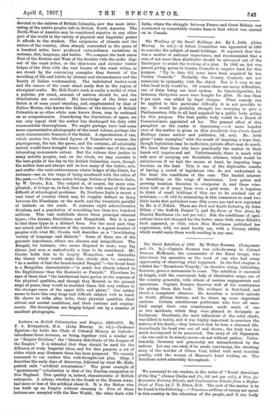The Working of the Small Holdings Art. By L. Jebb.
(John Murray. la. net.)—A Select Committee was appointed in 1889 to consider the subject of small holdings. It reported that this was a matter of national importance, and recommended that a sum of not more than £5,000,000 should be advanced out of the Exchequer to assist the working of a plan. In 1892 an Act was passed giving power to County Councils to acquire land for this purpose. "Up to date 812 acres have been acquired by ten County Councils." Probably the County Councils are not commonly in sympathy with the object. Nor is it easy to nay what local body would be. Of course them are many difficulties, one of them being our land system. In Cambridgeshire, for instance, thirty-two acres were bought for 4700. No less than 8 per cent. was added by legal charges. What remedy can be applied to this particular difficulty it is not possible to say. It would be probably thought too sweeping to give a Parliamentary title to all land acquired by a public body acting for this purpose. The best public body would be a Board of Commissioners appointed ad hoc. The general effect of this pamphlet on the reader is depressing.—A more hopeful view of the matter is given in How Landlords Can Create Small Holdings (same author and publisher, Bd. net). Mr. Jebb gives "some examples," with the result of inspiring a hope that, though legislation may be ineffective, private effort may do much. We trust that those who have practically the matter in their hands will inquire and act. Unfortunately, there is much wild talk now of carrying out Socialistic schemes, which would be mischievous if we had the means at hand, by imposing huge burdens on the land. This is one of the deplorable results of having a crowd of legislators who do not understand in the least the conditions of the case. The landed interest is trembling on the verge of insolvency. Low prices and growing taxation threaten to overpower it, and these wise- acres talk as if every farm were a gold mine. It is hopeless to think of small holdings if they are to be crushed out of existence.—It will be interesting in this connexion to read two little books first published some fifty years ago and now reprinted by Mr. A. C. Fifield. These are Fork and Spade Industry, by John Sillett ("the Suffolk Draper"), and My Perm of Two Acres, by Harriet Martineau (le. net per vol.) But the conditions of agri- culture have not changed for the better since 1848, when Sillett's book appeared, or 1859, when Miss Martineau published her experiences, told, we need hardly say, with a literary ability which would make them worth reading in any case.










































 Previous page
Previous page